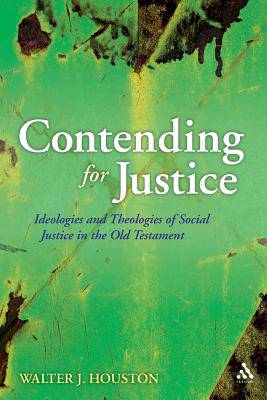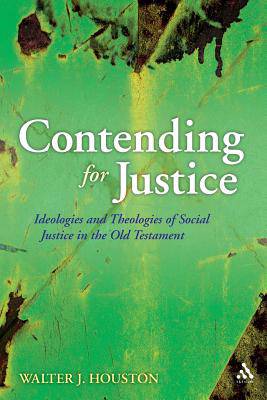
Door een staking bij bpost kan je online bestelling op dit moment iets langer onderweg zijn dan voorzien. Dringend iets nodig? Onze winkels ontvangen jou met open armen!
- Afhalen na 1 uur in een winkel met voorraad
- Gratis thuislevering in België vanaf € 30
- Ruim aanbod met 7 miljoen producten
Door een staking bij bpost kan je online bestelling op dit moment iets langer onderweg zijn dan voorzien. Dringend iets nodig? Onze winkels ontvangen jou met open armen!
- Afhalen na 1 uur in een winkel met voorraad
- Gratis thuislevering in België vanaf € 30
- Ruim aanbod met 7 miljoen producten
Zoeken
Contending for Justice
Ideologies and Theologies of Social Justice in the Old Testament
Walter Houston
€ 161,45
+ 322 punten
Omschrijving
Contending for Justice analyses texts on social justice in the Old Testament and argues that despite their ideological character they may still assist in shaping a Christian theological approach to social and global injustice. The book argues on the one hand that a class interest is involved in all texts on the subject of social justice, and on the other that, that the very interest demands that they should appeal to the broadest possible public by using generally accepted ethical and theological ideas.
Four elements are set out in a hermeneutical proposal: texts should be understood as rhetoric in real social situations, as ideology protecting a social position, as defining recognized ethical values, and theologically as having a critical and constructive potential for the interpreter's own situation. A second chapter attempts to sketch the social conditions in which such texts were formed. The hermeneutical scheme is then applied, but not rigidly, to a wide range of texts: prophetic denunciations of oppression, texts in a variety of genres defining the characteristics of the just individual, texts in the Psalms and Isaiah defining the duty of the king to protect the poor, visions of a just community in the prophets, words of Torah aimed at protecting the indebted poor and restoring an independent peasantry, and assertions of the justice of God. The book concludes with brief reflections on the value of the Old Testament as a resource in the struggle for justice. This new paperback edition is fully revised and updated.Specificaties
Betrokkenen
- Auteur(s):
- Uitgeverij:
Inhoud
- Aantal bladzijden:
- 304
- Taal:
- Engels
- Reeks:
- Reeksnummer:
- nr. 642
Eigenschappen
- Productcode (EAN):
- 9780567033543
- Verschijningsdatum:
- 14/01/2009
- Uitvoering:
- Paperback
- Formaat:
- Trade paperback (VS)
- Afmetingen:
- 155 mm x 231 mm
- Gewicht:
- 453 g

Alleen bij Standaard Boekhandel
+ 322 punten op je klantenkaart van Standaard Boekhandel
Beoordelingen
We publiceren alleen reviews die voldoen aan de voorwaarden voor reviews. Bekijk onze voorwaarden voor reviews.











